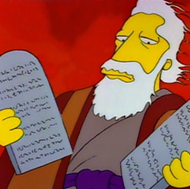For they shall be filled.
Until now my writing here hasn’t dealt with “current events,” and to the extent it’s been political, it’s been in the past tense (of more-or-less distant history). But in this post I’m going to break with that precedent. Infamously, the United States was attacked by terrorists on September 11, 2001. About 3,000 innocent people died on that day as a result of the attacks. On September 14, 2001, the United States Congress, by a joint resolution, passed the Authorization for the Use of Military Force (AUMF) Against Terrorists, which stated
That the President is authorized to use all necessary and appropriate force against those nations, organizations, or persons he determines planned, authorized, committed, or aided the terrorist attacks that occurred on September 11, 2001, or harbored such organizations or persons, in order to prevent any future acts of international terrorism against the United States by such nations, organizations or persons.
President George W. Bush signed this joint resolution (which a federal judge would later describe as “the most far-reaching bestowal of power upon the Executive since the Civil War”) into law on September 18, 2001. The source of the attacks was soon determined to be the terrorist group known as al-Qaida, operating from Afghanistan. Armed conflict between the United States-led coalition and al-Qaida and its Taliban supporters in Afghanistan started on October 7, 2001, less than a month after the terrorist attacks in the United States. And so began the long, so-called “war on terror.”
Almost immediately, coalition forces began to capture and detain enemy combatants. Historically, this term had been used to designate members of the armed forces of the state with which another state was at war. But after 2001 the United States redefined the term to mean basically the same thing as another term – unlawful combatant – and then applied it to
an individual who was part of or supporting the Taliban or al-Qaida forces, or associated forces that are engaged in hostilities against the United States or its coalition partners. This includes any person who committed a belligerent act or has directly supported hostilities in aid of enemy armed forces.
In 1942, the Supreme Court of the United States ruled that unlawful combatants were not prisoners of war and therefore were not entitled to most of the protections afforded under the Geneva Conventions. Now that the United States was essentially equating enemy combatants with unlawful combatants, it argued that detainees in the “war on terror” were not prisoners of war. And so began a long, twilight existence for these men.
Prison camps were built to hold the detainees at ultra-secure military bases like Guantánamo Bay, Cuba. Those targeted for detention were sometimes captured far away from any battlefield in extrajudicial, commando style raids, and then flown half a world away to prison. Because the coalition forces often relied on paid informants to identify enemy combatants, some (though certainly not all) of the detainees were not al-Qaida members or supporters, but simply innocent victims of greed or score-settling. Worse, many detainees were subjected to torture while in the custody of the United States, either directly or by proxy (i.e. via extraordinary rendition), during the years of President George W. Bush’s administration.
When President Barack Obama assumed office in 2009, he ended the practice of torturing detainees but, just like President Bush, he appears unable to implement a coherent plan to adjudicate their guilt or innocence. Although some detainees over the years have obtained judicial review, and some have been released from custody, it is estimated that upwards of 1,000 men have not been so fortunate, and are still being held without charges somewhere in the world. Naturally, efforts to prosecute these men, in any judicial setting, may well be compromised by the fact that many of them have been tortured. And so they continue to sit in prison. In the early years of the conflict, this situation may have been defensible, on the grounds that investigations takes time, the wheels of justice turn slowly, etc. But as the years pass – we are now in the tenth year of the “war on terror,” with no end in sight – and as these men remain entombed in extrajudicial limbo, their fate has become an urgent moral question for all Americans.
In an oft-cited passage from Fyodor Dostoevsky’s novel, The Brothers Karamazov, the character of Ivan Karamazov confronts his brother, Alyosha:
“Tell me straight out, I call on you – answer me: imagine that you yourself are building the edifice of human destiny with the object of making people happy in the finale, of giving them peace and rest at last, but for that you must inevitably and unavoidably torture just one tiny creature, that same child who was beating her chest with her little fist, and raise your edifice on the foundation of her unrequited tears – would you agree to be the architect on such conditions? Tell me the truth.”
“No, I would not agree,” Alyosha said softly.
“And can you admit the idea that the people for whom you are building would agree to accept their happiness on the unjustified blood of a tortured child, and having accepted it, to remain forever happy?”
“No, I cannot admit it . . .”
I already hear the cries of protest from some of you: Foul! How dare you compare the detainees to innocent children. In every way, it is an apples-and-oranges comparison: on the one hand, we have “stone-cold” reality – a tragic, but inevitable, fallout of war – an example of Realpolitik; on the other hand, we have a vivid, but imagined, scenario that attempts to address an ultimate question – theodicy – in a work of literature. Do you not see the fallacy of this?
I answer: In a way, I suppose that I do see it, but when it is a question of deciding whether to believe in “iron” or in “tender ideas,” I prefer to follow Vasily Rozanov, who once wrote:
This tender idea will outlive iron laws. Rails will break apart. Engines will break down. But for men “to weep” at the mere threat of “eternal separation” – this will never break down, this will never come to an end.
O people, believe in tender ideas. Throw away iron: It is only a cobweb. True iron is tears, sighs, agony. Only what is noble is true and will never be destroyed.
Again, I answer: How long? How long will you hold these men in prison without trial? Until the “war on terror” is declared over? Until al-Qaida is defeated? But hasn’t the United States already declared the detainees to be, in effect, unlawful combatants? Or else, why were/are they not being treated like prisoners of war? As such, it is no longer a question of merely holding them until the cessation of hostilities, and then freeing them. No, that bridge has been burnt. It is now a question of trying them, in some kind of court, to adjudicate their guilt or innocence, and then either sentencing them or freeing them, is it not? Will such a thing be easier ten years from now, twenty years from now, thirty years from now? Of course not! Memories fade; witnesses die. So why not try them now?
And if you reply: Perhaps we must detain them indefinitely – in effect, until they die – because it is simply too dangerous for us to let them go free. And if, as you say, we may never be able to properly adjudicate their individual guilt or innocence, then perhaps we must detain the whole lot of them indefinitely – in effect, until they die – for our safety,
Then I call on you – answer me: Imagine that you yourself are building the edifice of American destiny, like Presidents Bush and Obama, with the object of making the American people safe in the finale, of giving them peace and security at last, but for that you must inevitably and unavoidably torture several hundred innocent men, the same men who must now sit in prison (right alongside guilty men) for the rest of their lives, and raise your edifice on the foundation of their unrequited tears – would you agree to be the architect on such conditions? Tell me the truth.
There are two possible replies.
You may, like Alyosha, say: No, I would not agree.
Or you may say: Yes, I think we can do business along those lines.
This is called separating the wheat from the tares.



